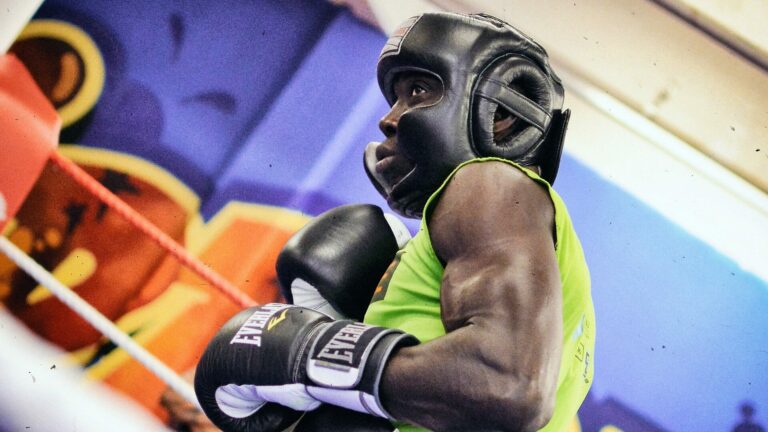Is Boxing Unethical – Detailed Breakdown

The answer to the question fundamentally depends on whether boxing produces more ethically positive outcomes rather than negative. However, with morals being subjective, there is no tangible way to measure the effects of a sport like boxing on society at large. Both sides of the argument have equally valid points so people’s opinions will often differ depending on their knowledge and experiences within the sport. Below, we’ve compiled some arguments for and against to help you make a justified conclusion.
The easiest argument in favor of boxing is the opportunities it can provide for the unprivileged. Along with regulatory measures that make the discretion between sport and pure violence. These are the two most common defenses made by the boxing community regarding the ethics in boxing.
On the other hand, you could argue that boxing is unethical as the desired outcome is to land blows on your opponent until they are unconscious. While knockouts don’t always occur, they are often the most sought-after result. For many boxers and boxing fans, this is simply another facet of the game. However, others find the notion of concussing someone in the name of sport unjustifiable.
What is Ethics?
Ethics are the recommended behaviors and concepts that humans automatically follow through subconsciously wanting to be ‘Good, Fair, and Just. An individual’s opinion on different aspects of ethics can vary depending on upbringing, environment, and current or past situations. In this article, we’ll be going through how ethics ties into different aspects of boxing, allowing you to make a justified decision based on the facts.
Ethical Arguments For & Against Boxing
For:
- Encourages fitness which is excellent for both mental & physical well-being
- Can create healthy competition
- Keep individuals focused and dedicated while also giving them purpose
- Teaches respect and accountability
- A good way of learning self-defense
- Can be a lucrative career path
Against:
- May cause brain damage and other health-related injuries later on if life
- Normalises violence and glorifies the idea of victory after beating an opponent
- May lead to an increase in aggression – For more information see Does Boxing Make You Aggressive
Why Boxing Is Not Unethical
As a boxing enthusiast, I’d like to briefly run over the safety precautions, guidelines, and nature of the sport which defends boxing in terms of ethics. One of the main arguments for supporting the idea that boxing isn’t an unethical sport is the fact that the rules and regulations that are set in place have to be respected by all participants. This shows that professional competitors understand that certain prohibited acts must be avoided at all costs. The penalty for such acts may consist of sanctions, fines, and disqualifications.
When diving deeper into the sport of boxing the high demand for respect and discipline becomes prevalent. From a young age, many proteges are instructed to remain focused, determined and resilient which allows them to progress quickly and achieve great things in the sport.
This level of commitment has often helped the unprivileged or troubled youth out of trouble. It provides them with a purpose and mindset set that they can extrapolate and apply to other areas of life. Analyzing this factor from an ethical standpoint indicates boxing may help individuals live more fulfilling, honest, and dedicated lives.
Watching boxers embrace their opponents after heated bouts also suggests the mutual respect that most fighters have for each other. Some people don’t recognize boxing as a true sport because of its inherent violence. However, like many other sports, boxing is all about courage, strength, respect, and commitment.
In some cases, boxers do get knocked unconscious, which usually happens at the highest levels however the aim is never to injure or hurt. This takes place as a result of years of dedication and training which allows fighters to strike with speed and precision.
Examples Of Ethics In Boxing:
- Strikes can only be on the front and the side of the upper torso, this differs from sports such as MMA (mixed martial arts) where more dangerous strikes are permissible
- A five-minute break is offered to any fighter receiving a low blow
- Fighters are asked by the referee if they are physically capable to continue after a knockdown
- Gloves are monitored thoroughly to ensure the protection of fighters. Antonio Margarito was caught loading his gloves with plaster in his first bout with Miguel Cotto. This led to him losing his boxing license and being unable to fight for an extended period
- The referee will pull fighters out of the fight if they suspect a fighter is not able to protect themself
- Fighters in heavier divisions use heavier gloves which adds more protection for both boxers
- The maximum number of rounds allowed to be scheduled was reduced from 15 to 12
Why Boxing Is Unethical
It’s quite easy to argue that boxing is unethical. Striking other humans for sport can easily be considered primitive. For some people, the notion of fighting someone you have no personal grievance with sounds absurd. Many boxers will tell you that there is no malice involved in the punches exchanged. But despite this, there are many people who won’t agree with such a violent sport.
The other major point that people often bring up when discussing ethics in boxing is brain damage. When the brain is repeatedly struck with force, it may lead to irreversible damage. This may be why some professionals notice a decline in brain health as they get older. Knowing this factor and still allowing the sport to be practiced at highly advanced levels with high monetary incentives may be perceived as unethical by some.
However, it’s quite easy to argue that there are many other sports like rugby and American football that cause a lot of concussions but don’t receive the same bad reputation. While this is the case and in fact, there are several sports that cause many more head injuries than boxing, some people will take issue with intent. In boxing, there is a specific intent to render your opponent unconscious for a short period of time. While there is often no malice between the two fighters, they are both looking for the best possible way to win the bout.
The effects of repeatedly taking punches to the head have been well documented. Here’s a list of well-known boxers who suffered from health issues that may have been linked to the sport:
- Muhammed Ali
- Sugar Ray Robinson
- Joe Lewis
- Prichard Colon
- Mike Tyson
- Floyd Mayweather
Examples Of Unethical Facets In Boxing
- Boxing is an extremely lucrative sport that encourages young individuals to dedicate their lives to violence
- The notion of punching someone with the intent to render them unconscious is reprehensible for many people
- Repeated punches to the head can often lead to brain damage
- In some cases, the violence displayed in the ring may be used in the real world. This may be due to an inability to control anger and frustration
- The psychological side of boxing can also be highly damaging – Chris Eubank expressed how deeply he was affected by his fight with Michael Watson
- Teaching that violence isn’t just used for self-defense purposes may create individuals more inclined to be involved in physical altercations outside the ring
Conclusion
Fighting has been around since the dawn of time, some believe the instinct is held deep within human biology. We’ve always gravitated towards fighting and competition. Whether, its for the better or worse, there is no denying that violent competition is attractive to the general public. It creates excitement because it is a spectacle. However, not everything that feels natural is intrinsically right.
Both sides of the argument make compelling cases for themselves in regards to whether or not boxing is an ethical sport. As I mentioned earlier, I think the answer to this question depends entirely on whether boxing has done more good or bad for society at large.






